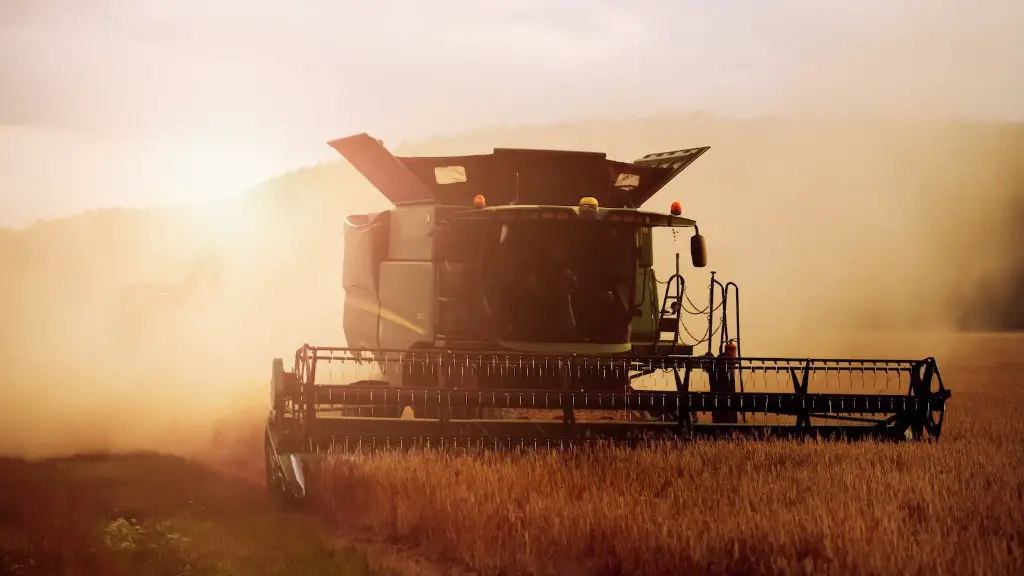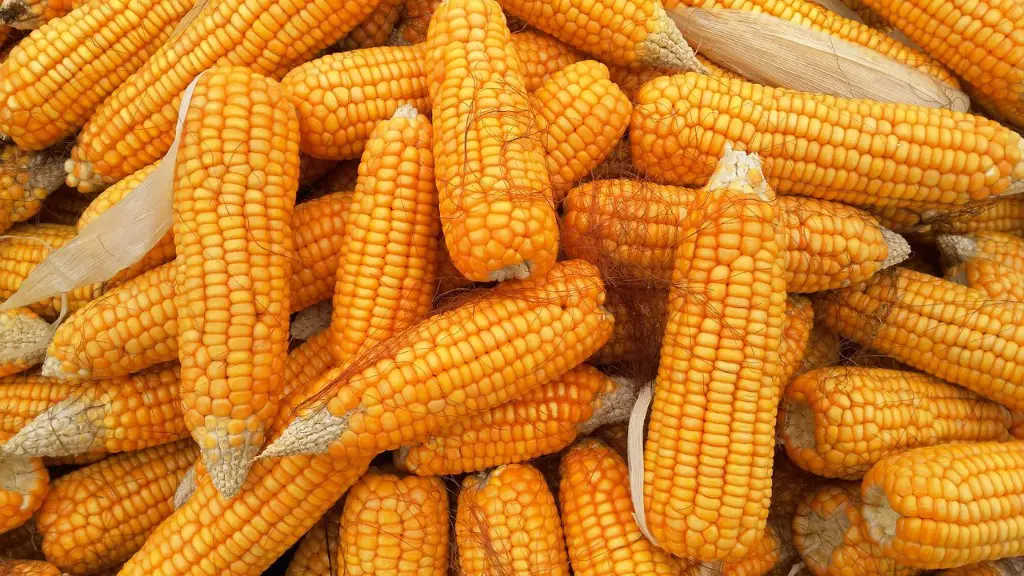Agriculture-related activities are an essential cornerstone of all human societies, impacting both economic and social life. It is perhaps for this reason that it is one of the earliest archeological and historical pursuits. Agriculture has had an immense impact on the development of civilization, allowing for the development of complex societies, from small nomadic tribes to large cities and nations. This article will take a look at how agriculture has shaped the development of human cultures and societies across the globe.
One of the most prominent changes brought on by the introduction of agriculture is the transition from a nomadic lifestyle to a sedentary one. Prior to the adoption of farming and related activities, most societies relied on hunting and gathering for sustenance. This lifestyle was largely nomadic, requiring the inhabitants of a given area to travel in search of food and resources. With the introduction of farming, however, these societies instead settled in certain areas and developed a system of crop cultivation to meet their resource needs.
Another noteworthy impact of the development of agriculture has been its role in the emergence of complex societal and political structures. Farming, on the whole, created a more stable food supply, and it was this stability that allowed communities to organize around more ambitious and advanced projects. As the new societies flourished, advanced political and social organizations developed, including powerful governments and large-scale religions.
Furthermore, agriculture has had an important effect on the economy of societies throughout human history. For much of the early human experience, economies relied heavily on barter and trading systems, but with agriculture, people could cultivate food and resources and exchange them as commodities. This allowed societies to create more specialized and secure sources of income, allowing them to finance large-scale projects and trade on larger scales.
It is clear that agriculture has had an immense impact in shaping human cultures and societies. It enabled the development of sedentary lifestyles and allowed for the creation of complex societies and powerful governments. Its impact on the economy has been similarly profound, allowing people to exchange resources in a much more efficient and lucrative manner. It is for this reason that agriculture remains a cornerstone of human culture and will continue to do so for many years to come.
Societal Advancement
The emergence of large-scale societies and civilizations was greatly enabled by the introduction of agriculture. Prior to the development of farming, many nomadic societies relied on hunting and gathering to survive. With the more reliable food supply that came with agricultural production, permanent settlements began to emerge and take shape. This allowed these societies to embark on ambitious projects, such as the development of powerful governments and grand monuments.
Agricultural production has granted many civilizations the ability to support a much larger population, thanks to the increased food supply. This has allowed these societies to develop specialized professions and increased the flow of trade. As the population grows and is able to specialize, resources can become more abundant and efficient. This improved resource availability has allowed societies to flourish and embark on more clandestine endeavors.
The development of agricultural technology has also had a major impact on societal advancement. Through trial and error and the sharing of knowledge, farming methods have become more efficient and capable of producing higher yields. This has allowed people to become more productive and produce more food in less time, allowing for the development of societies that can concentrate resources on research, creativity, and the arts.
In a nutshell, the introduction of agriculture has had a profound effect on the development of social and governmental systems. Without the stable food supply that it provided, complex societies would have been impossible. It has also enabled the development of technology, supporting more efficient food production and making it possible to support a much larger population.
Cultural Impact
Agriculture has had a major impact on human cultures as well. Perhaps the most obvious effect is the rise of cultural practices centered around agriculture, such as religious beliefs and rituals. Around the world, many cultures developed many religious or spiritual practices around the agricultural cycle, such as the hajj pilgrimage for the lunar Islamic calendar or the ancient Egyptian New Year’s celebrations. Such practices became deeply ingrained in their cultural identity, allowing for the development of a cohesive community.
Agriculture has also been a driving force behind the development of traditional music and art. The introduction of seasonal crop cycles has resulted in the celebration and documentation of such events through music and art. Furthermore, many cultures also hold festivals to celebrate the harvesting of various crops, with performances of traditional music and dances taking center stage.
Finally, agriculture has been an essential element of many traditional cuisines around the world. These cuisines are often deeply rooted in a culture’s agricultural history and rely heavily on the local produce. As a result, most traditional cuisines are unique to their respective cultures and feature the many dishes that have been passed down through generations.
In conclusion, the introduction of agriculture has had an immense impact on many cultures around the world. From the development of religious beliefs and rituals to the celebration of traditional music and art, cultures have embraced agricultural production as a central part of their identity. Furthermore, the emergence of traditional cuisines has allowed us to share in the gastronomic experiences of different cultures.
Environmental Impact
Apart from the impact of agriculture on human societies, it is also important to consider the environmental impact of this practice. Agricultural activities, if not managed properly, can cause serious environmental damage. In particular, when done on a large scale, it can produce significant amounts of greenhouse gas emissions, such as nitrous oxide and methane, which can have detrimental effects on the environment.
In addition, agricultural activities can also lead to land degradation, as the intensive use of fertilizers and pesticides may strip the soil of its nutrients, contaminating surface and groundwater with dangerous chemicals. Similarly, the overuse of irrigation can cause water scarcity in certain locations, resulting in further environmental damage.
Another environmental concern associated with agricultural activities is deforestation. As demand for arable land increases, pressure to clear forests for agricultural land is growing. This, in turn, affects the natural ecosystems in the area, leading to loss of biodiversity and decreased carbon sequestration.
While it is clear that agricultural activities can have a severe negative impact on the environment, measures can be taken to reduce this damage. Sustainable farming techniques, such as the use of cover crops to enrich soil and catch important nutrients, can be used to help mitigate some of these impacts.
In conclusion, agricultural activities have the potential to have a detrimental effect on the environment. Greenhouse gas emissions, land degradation, water scarcity and deforestation are all problems associated with agricultural activities. However, with the implementation of sustainable farming techniques, these impacts can be lessened, helping to ensure a clean and healthy environment.
Economic Impact
The economic impact of agriculture has been profound as well. Most notably, it has allowed for the emergence of markets, in which different commodities are exchanged and traded. This, in turn, allowed for the specialization of certain professions and the emergence of complex economic systems.
Agriculture has also enabled the production of food surpluses. This, in turn, made it possible for civilizations to support larger populations and to engage in more ambitious projects. As such, agriculture has been an integral part of most ancient civilizations and continues to be a major economic force today.
The modern agricultural industry is focused largely on the production of food and other commodities, such as lumber and livestock. However, it is also closely linked to many other industries, such as the textile industry, which relies heavily on the cultivation of cotton and other plant fibers, and the pharmaceutical industry, which uses agricultural products as raw materials for drug production.
In addition, the agricultural industry has also been instrumental in the development of agrotourism. This industry centers around the promotion of destinations with natural and agricultural scenery, often providing activities such as hiking, bird-watching, and, of course, food tasting.
All in all, the development of agriculture has had a large economic impact. It has enabled the emergence of markets, allowing for specialization, and has fostered the growth of other industries as well. Furthermore, it has been a major factor in the emergence and growth of agrotourism, creating another source of income for individuals and communities alike.
Impact on Politics and Culture
Finally, one must take into account the impact of agriculture on the development of politics and culture. As we have discussed at length, the development of agriculture enabled the growth of complex societies and powerful governments. This, in turn, led to the formation of strong political systems which, in many cases, have had a lasting and profound impact on the societies in which they exist.
Agricultural production has also been one of the chief reasons for the emergence of many of the world’s great religions. From Hinduism to Christianity, agricultural production enabled the production of food and resources, which in turn allowed for the growth of a religious following. From there, these religions had a wide-reaching impact, influencing many aspects of culture and politics.
In conclusion, it is clear that the development of agriculture had a major impact on the development of politics and culture. It enabled the development of complex societies and powerful governments, which in turn fostered the growth of various religions. Furthermore, it allowed for an abundance of food and resources, allowing for specialization and allowing societies to develop more ambitious projects.





